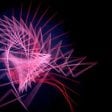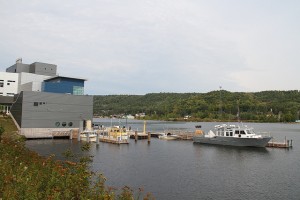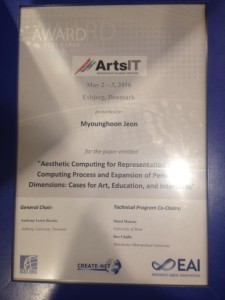Myounghoon “Philart” Jeon (CLS/CS) received the best paper award for his paper entitled, “Aesthetic Computing for Representation of the Computing Process and Expansion of Perceptual Dimensions: Cases for Art, Education and Interfaces” at the ArtsIT 2016 Conference held at Aalborg University, Denmark.
The William G. Jackson Center for Teaching and Learning announces the funding of three proposals intended to build and strengthen online learning at the graduate level.
These proposals were selected for their potential to expand online graduate enrollment and help instructors learn online instructional tools and current best practices.
The funded proposals are:
- “Master’s Degree Program in Natural Resources.” PI—Andrew Storer (Associate Dean, SFRES), $21,000.
- “Core Courses for Applied Sciences Education Masters.” PI— Shari Stockero (CLS), Co-PI— Emily Dare (CLS), Co-PI— Kedmon Hungwe (CLS), $10,000.
- “Pilot Development for Graduate Program in Powertrain Systems.” Co-PI’s—Jeff Burl (ECE) and Jeremy Worm (ME-EM/Mobile Lab Director), $5,000.
From Tech Today, by Jackson Center for Teaching and Learning- Read full article
The Vice President for Research Office announces the 2016 REF awards and thanks the review committees, the deans and department chairs for their time spent on this important internal research award process. Among the recipients are:
Research Seed (RS) Grants
Joshua Ellis, Cognitive & Learning Sciences (Co-PI); Cecile Piret, Mathematical Sciences (PI)
Portage Health Foundation (PHF) Research Seed (RS) Grants
Adam Feltz (PI), Cognitive and Learning Sciences; Selin Philips (Post-Doc), Cognitive and Learning Sciences
Scholarship and Creativity Grants
Amy Lark (PI), Cognitive and Learning Sciences
 Engaging Students in Physical Science
Engaging Students in Physical Science
ED 5650 2 credits, FREE!
June 13 – 17, 2016
Summer 2017 (Dates TBD)
Deadline: May 15, 2016
Cost: Free! (includes room and board.)
The purpose of the course is to increase the content knowledge and pedagogical knowledge of secondary science physics and physical science teachers. Specific content focus will be around forces and motion, energy, and properties of and change matter and the application of these content areas in engineering to prepare teachers for NGSS. These topics are the core of understanding physical phenomena all around us and address the state standards. Instructional focus will be placed on improving skills to delivery inquiry-based science instruction in the classroom. Additionally, emphasis will be placed on learning how to provide students with meaningful, real-world contexts and applications by learning about engineering design processes.
ED 5650
2 credits
Learn more and apply at Teacher Professional Development Summer Institutes.

HOUGHTON — The community is invited to the Lake Superior Celebration from 6 p.m. to 8 p.m. on Tuesday, Apr. 26, 2016, at Michigan Tech’s Great Lakes Research Center (GLRC). The event is FREE, family-friendly, and open to all.
The event is sponsored by the Lake Superior Stewardship Initiative, Michigan STEM Partnership, Western U.P. Center for Science, Mathematics and Environmental Education, Michigan Tech Center for Science and Environmental Outreach, Michigan Tech Center for Water and Society, and the Copper Country Recycling Initiative.
Visit the Lake Superior Stewardship Initiative on the web or on Facebook.
Myounghoon Jeon (CLS/ICC), is the principal Investigator on a project which has received a $76,336 research and development grant from George Washington University.
The project is entitled “NRI Music-based Interactive Robotic Orchestration for Children with ASD.”
Joan Chadde, director of the Center for Science and Environmental Outreach, presented at the Belle Isle State Park Natural Resource Roundtable last Thursday, April 14, 2016. The roundtable was hosted by the Belle Isle Conservancy’s Environmental Conservation Committee and the Michigan Department of Natural Resources to share interests and potential collaborations.
Michigan Tech and Wayne State University were the only two universities in Michigan invited to participate, in addition to a dozen government agencies and non-profit organizations.
Chadde has engaged Detroit teachers and students in natural resource stewardship activities on Belle Isle since 2009, supported by three different grants.
Science fairs encourage students to explore
HANCOCK – Through the Western Upper Peninsula Center for Science, Mathematics and Environmental Education, students from the five Western U.P. counties are offered hands-on incentives to explore science, math, engineering and the environment in which they live.
Read more at the Mining Gazette, by Graham Jaehnig (subscription required).
 The Engineering Process
The Engineering Process
ENG 5100 4 credits
July 11 – 22, 2016
Deadline: May 6, 2016
The course is intended to introduce engineering to pre-college teachers* in order to help teachers acquire tools for integrating engineering into their science classrooms under the framework of the new Michigan Science Standards. The course provides teachers with a meaningful experience about the process and methods that engineers use to solve problems. The engineering process (as compared with the scientific process) will be outlined, as will some of the “non-technical” aspects of engineering. Students will explore how the course objectives are related to the NGSS (and the new Michigan Science Standards), specifically identifying ties to the foundational dimensions of the standards; Disciplinary Core Ideas (DCIs), Science and Engineering Practices (SEPs), and Crosscutting Concepts (CCCs). Students will be required to complete a design project that meets design criteria culminating in testing of the project and analysis of the results. This course is a required, cornerstone course for our Master’s degree program in Applied Science Education.
*Mi-STAR curriculum developers will be given first preference.
ENG 5100
4 credits
Learn more and apply at Teacher Professional Development Summer Institutes.
 Teaching Science in Three Dimensions: The NGSS in Theory and Practice
Teaching Science in Three Dimensions: The NGSS in Theory and Practice
ED 5540 3 credits
June 27 – August 11, 2016
Deadline: May 6, 2016
This course examines the Next Generation Science Standards and Framework for K-12 Science Teaching (NGSS), the theory underlying them, and what it will take for teachers to transform science teaching practice in ways that align with these standards. The course will focus on critiquing and developing lessons and assessments that incorporate the three dimensions of disciplinary core ideas, cross-cutting concepts, and science and engineering practices. The benefits and challenges of integrating across science and engineering disciplines will be discussed.
ED 5540
3 credits
Learn more and apply at Teacher Professional Development Summer Institutes.
